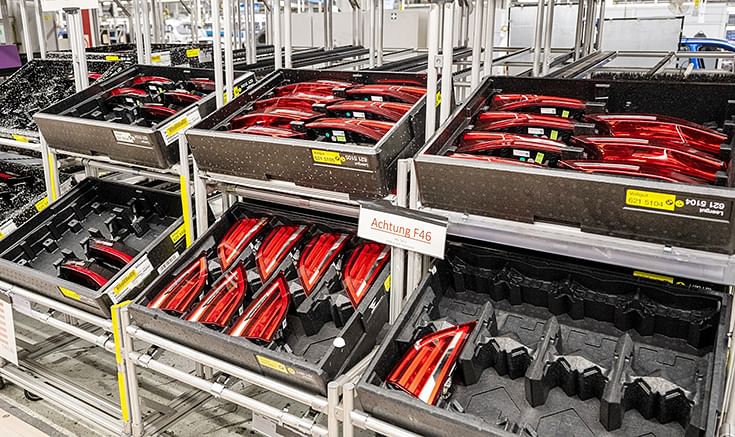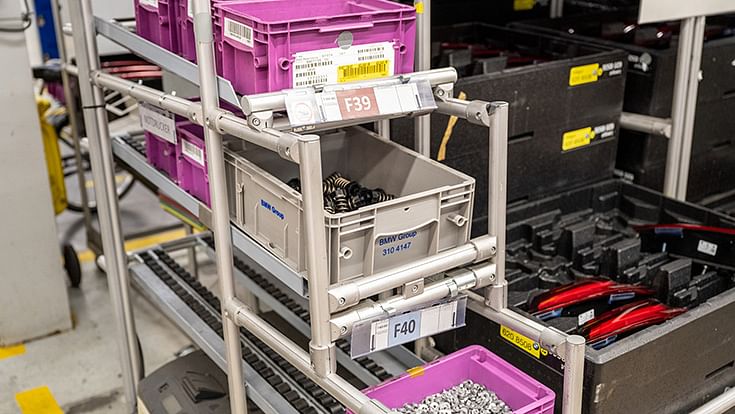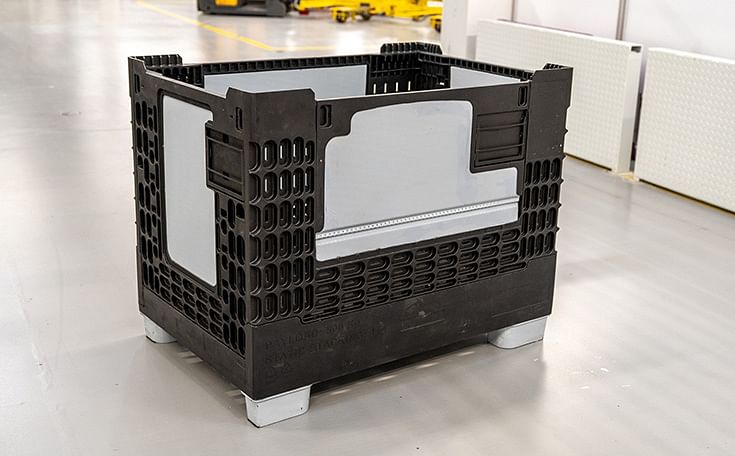BMW walks the sustainability talk in packaging logistics
BMW Group to use more recycled material in in reusable packaging; alternative sustainable materials, reduce single-use packaging, introduce lightweight packaging and also reduce transport volumes to save carbon emissions and raw materials
The BMW Group is pushing the envelope when it comes to sustainability. And the effort now includes several projects in its packaging logistics to further save resources. With these projects, the Group aims to work closely with suppliers to reduce carbon emissions and realise the principles of the circular economy as best it can.
As part of this initiative, the European plants will use more recycled material in their packaging. This will mean that, for newly awarded contracts, the proportion of recycled material in reusable packaging for logistics purposes will almost double this year from around 20 percent to over 35 percent. However, using alternative sustainable materials, reducing single-use packaging, introducing lightweight packaging in certain areas and reducing transport volumes will also help cut carbon emissions.
The BMW Group say it "is monitoring the impact of individual measures via a CO2 calculator for packaging. The Group’s overall aim is to reduce CO2 emissions in the supply chain by 20 percent per vehicle (compared to 2019)."
According to Michael Nikolaides, Head of the BMW Group Production Network and Logistics: “Our ‘re:think, re:duce, re:use, re:cycle’ approach is being implemented consistently in packaging logistics, too. We’re using innovative strategies to consistently reduce the volume of resources we use, thus reducing our carbon footprint. We in Logistics are also doing our part to get the BMW iFACTORY up and running – with a particular focus on the ‘green’ side of things.” BMW iFACTORY. LEAN. GREEN. DIGITAL. is the strategic vision for the global production network, with an emphasis on flexibility and efficiency, sustainability and digitalization. It provides an answer to the challenges involved in the transformation to e-mobility and takes a global approach. ‘Green’ means leveraging the latest technologies to create a production process that uses minimal resources.
Plastic in packaging replaced by recycled material
One example of how the BMW Group is fulfilling the criteria of a circular economy is the use of recycled material in EPP packaging (EPP = expanded polypropylene). Currently, its newly developed EPP packaging already contains 25 percent recycled material.

Use of recycled material in EPP packaging will help save almost 280 tons opf CO2 annually.
EPP is used in special containers as its shape can be adapted to the components being packaged, allowing them to be transported safely. Around 360,000 of these containers are needed each year. Using 25 percent recycled material allows us to save almost 280 tons of CO2 annually. There are plans to increase this proportion of recycled material even further, with the first pilot schemes with 100 percent recycled material currently underway. If these tests are successful, this configuration will become standard for new contracts from 2024.
An additional 680 tons of carbon emissions savings can be made every year by using covers and so-called small load carriers with 50 percent recycled contents. As things stand, these measures are focused within the European markets due to the current waste management situation and available recycling infrastructure. We are currently working towards expanding to our locations in Mexico, the USA and China.

Using small load carriers with recycled content can facilitate an additional 680 tons of carbon emissions savings
Reducing transport volumes
The BMW Group is also introducing something that will have an even greater impact on emissions: folding large load carriers. As of this year, instead of pallet cages made of steel, it will be using folding plastic alternatives made from over 90 percent recycled material. These work in a similar way to the collapsible shopping crates that most people are familiar with: when they are empty, they can be folded up, making them easier to transport. Using 15,000 of these new containers reduces CO2 by around 3,000 tons per year.

Instead of pallet cages made of steel, BMW Group will use folding large load carriers made from over 90 percent recycled material. When they are empty, they can be folded up, making them easier to transport.
Alternative materials with great potential
When it comes to packaging, the sky’s the limit. The BMW Group is launching pilot projects using bio-based materials to replace oil-based substances polyethylene and polypropylene (PE and PP). The company is also investigating whether and in what ways it can use materials from recycled household appliances in its packaging. In the long term, the overall aim is to use alternatives to raw materials across the board.
ALSO READ
India's Econovus and the art of sustainable packaging
RELATED ARTICLES
RSB Group Prepares for Hyper-Growth: New Markets, Tech and Mission ₹10,000 Cr
From a small workshop in Jamshedpur to an engineering group with global reach, RSB Transmissions is preparing for its mo...
Beyond Helmets: NeoKavach Wants to Make Rider Airbags India’s Next Safety Habit
As premium motorcycles proliferate and riding culture evolves, an Indo-French venture is betting that wearable airbags, ...
Inside Mahindra Last Mile Mobility’s Rs 500 Crore Modular Platform Strategy
Mahindra Last Mile Mobility has launched the UDO, an electric three-wheeler built on a new Rs 500-crore modular platform...






 By Autocar Professional Bureau
By Autocar Professional Bureau
 17 Aug 2022
17 Aug 2022
 5130 Views
5130 Views




















 Darshan Nakhwa
Darshan Nakhwa



 Shahkar Abidi
Shahkar Abidi

